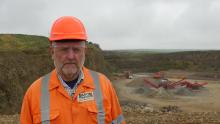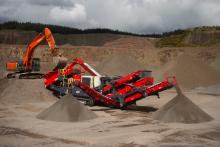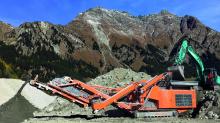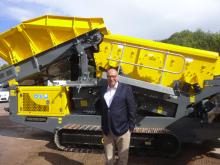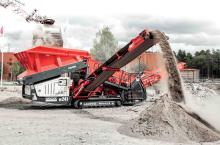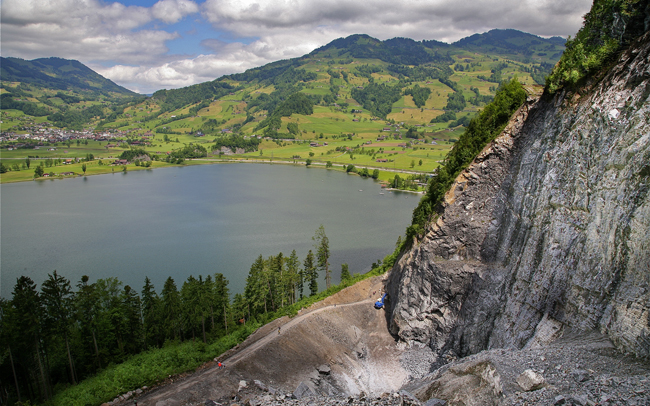
Premium plant from Metso is optimising production at a major Swiss hard rock quarrying operation, while a recent acquisition by an ambitious Austrian global market OEM is already paying dividends. Guy Woodford & Liam McLoughlin report.
Swiss firm KIBAG Kies Seewen has regularly optimised its quarrying and processing operation at its Zingel quarry over the past years, with Metso machinery supplied by Swiss
Situated on Lake Lauerz near the town of Schwyz, Zingel quarry has been operated by KIBAG Kies Seewen (KIBAG) for 40 years. However, hard rock has been quarried there for more than a century. With an annual production volume of just under 300,000tonnes, the site covers one-tenth of the national demand for high-quality hard rock. Consequently, it assumes an important supply role for the regional construction industry and the Swiss Federal Railways (SBB). Today the quarry still has licensed reserves of around 13 years. At the site, a type of siliceous calcareous limestone is extracted and processed. The material is low-abrasive, but its hardness is rather high (crushability index of 20), which makes it highly demanding on the processing technology that is used.
The close cooperation between Josef Drossard and the management of the Zingel gravel and concrete plant in Seewen started seven years ago. At that time, a new-to-market Metso Nordberg (Nordberg) C120 jaw crusher was lent to Zingel quarry for a two-year evaluation by site bosses. After its convincing performance as a primary crusher, the model was purchased by KIBAG as part of an upgrade of the Zingel quarry site. It has since proven to be a very worthwhile model within the quarry’s plant fleet.
In early 2017, KIBAG again invested via Josef Drossard in a Metso plant for Zingel quarry. This time, a Nordberg NP1110 impact crusher was installed as a secondary crusher for ultra-fine particle fractions (feed material 0/16mm). The finely adjustable, automated control of the machine ensures consistent product quality. Depending on the throughput, crushing bed positions, and machine speed, an optimum grain shape can be achieved in the continuous preparation process.
One of KIBAG’s main demands was to significantly increase and optimise the sand production content via the new crusher. The potentials for flexible control provided by the Nordberg NP1110 were thus a feature welcomed by the operator. Before the acquisition, rock analyses were carried out and the values were inserted in Metso’s crushing simulation software, Bruno. The predicted results were not only highly promising, they were also confirmed in practice after the final installation of the machine.
After commissioning, it turned out that the results corresponded 99% with the predicted results from the Bruno simulation software. “With this system, we were able to produce high-quality products right away. In addition to the accustomed service culture of our local Metso distributor, Josef Drossard, we were also convinced by the high service lives of the chrome-ceramic impact bars in the new Metso crusher. The maintenance intervals are pleasingly far apart,” says workshop manager Kaspar Herger.
Due to the long crushing beds and the longer residence time of the material inside the Nordberg NP1110 machine, the inter-particle comminution in the Metso crusher is much higher than its predecessor. Both crushing beds and the crusher gap can be calibrated automatically, which usually happens only once a day via the control system. Using the new Nordberg NP1110, the Zingel quarry additionally benefits from the higher degree of comminution. The fact that the speed of the crusher can be flexibly controlled is due to the built-in frequency converter, which covers a large speed range.
To increase secondary crushing volumes of 16/40mm feed material at Zingel quarry, KIBAG will replace an old impact crusher with a Metso Nordberg GP220 stationary cone crusher. The new plant will improve particle geometry quality as well as efficiency. It will also lower production as well as maintenance costs dramatically. With close cooperation between the new Nordberg GP220 cone crusher and the existing Nordberg NP1110 impact crusher, KIBAG will be able to increase the proportion of sand production at Zingel quarry at any time, giving operators greater flexibility in planning their future revenue streams. Depending on the market and storage depot situation, part of the final product from the Nordberg GP220 could then be processed into sand via the Nordberg NP1110.
“Our production got a big boost. With the new [Nordberg NP1110] plant, we produce higher quality sands and proportionally more fractions of our choice. The screening curve is also much more consistent,” says workshop master Konrad Schorno. The sand content (0/4mm) of the feed material (0/16 mm) is initially around 28%, but after processing by the Nordberg NP1110 impact crusher it is 84%. The rail ballast fraction (16/63mm) makes up more than 50% of the total production and is the main product of the Zingel quarry. That is followed by gravel and then by crushed sands as asphalt additives (in the usual fractions of 0/2, 2/4, 4/8, 8/11, 11/16 and 16/22mm).
The primary Nordberg C120 jaw crusher at Zingel quarry currently processes 350tonnes/hour of material. Due to the bottleneck situation caused by the overland belt conveyor, however, only 170tonnes/hour can currently be directly processed further. The remaining amount of material is fed via the excavated cavern to a temporary storage depot, from which it is reclaimed at a later time for further processing. About 80tonnes of the immediately processed material from the primary crusher is going directly to further processing into railway ballast. Thanks to a direct rail connection from the site, the material can be directly loaded and dispatched. This is pretty special, as access to quarries in Switzerland is generally anything but optimal. The difficulty of accessibility is recognised by the fact that the 40tonne primary crusher, due to the steep access route, could only be delivered in pieces and assembled at its final location.
Rubble Master is developing a range of new products following its acquisition of Northern Irish mobile screen unit manufacturer
Austrian crusher and screen maker
Rubble Master founder and CEO Gerald Hanisch said the new products, jointly developed with Maximus, will be showcased at next year’s giant
Two new products have already come to market since the merger: the Rubble Master HS3500M crawler mobile scalper, and the Maximus 409 vibrating scalper. “There are many more to come,” says Hanisch.
He adds that the acquisition of Maximus is another step for Rubble Master towards expanding its product portfolio and offering customers a complete range of crusher and screening technology from a single source.
“We didn’t have a screen line and we needed one,” says Hanisch. “We decided to invest in Maximus because its products are a good match for our RM crushers and our expansion plans.
“We know that the region has the expertise and specialists that we need to continue our growth and further cement our position as a driver of innovation and world market leader in mobile crushing and recycling.
“Maximus will increase our speed to market on the screening side. We will exchange views with them and this will create great ideas and new solutions. We are not competitors, we will complement each other.”
He adds that the two brands will maintain separate identities following the merger, bringing out products under their own names.
The company’s current best-selling models are the RM 90GO! 23.6tonne tracked crusher and the RM 100GO! 29tonne crusher with crawler gear.
Investment is being injected into the Maximus site at Dungannon. Maximus MD Neil Collins says the funding will guarantee sales and service jobs at the plant and create new jobs in the technical and business sectors including welders, painters, quality management staff and sales administrators.
“We will invest several million pounds here in Dungannon and upgrade the site,” says Collins. “To this end, we’re looking for additional specialists to develop innovations for both brands and launch them on the market.”
The takeover by Rubble Master will boost the Maximus customer support operation, according to Collins. “They are number one in the world for after-sales support,” he says. “It will also give us volume because Rubble Master has a huge dealer network around the world.”
He adds that a big plus factor in the takeover for Rubble Master is that so much of the screening supply chain is contained within a small radius in Northern Ireland, including belts, pumps and hydraulics.
The biggest customers for Maximus screens are contractors in quarrying and demolition. “They are mobile machines that are easy to move so they can be rented out for a few weeks,” Collins says.
“We’ve been getting a lot of traffic to our website from customers in those countries,” said Ciaran Gillen, Anaconda’s global marketing manager. “A lot of money is going into new infrastructure in South Africa, and we are seeing guys [working in the construction and quarrying industries] starting their own companies, who are looking for new plant. It is similar to what was happening in the UK around six or seven years ago.
“Our trommels and compact screening models, in particular, are generating strong interest. The DF410 scalper is our most popular model, but we are finding that our SR fines screener range for aggregates and sand is really taking off.”
Speaking about the European quarrying equipment market, Gillen said: “The European market seems to be on the rise. We’ve taken on a few new dealers in Germany, and the Eastern Europe market is good. There is a bit of uncertainty in the UK market due to Brexit, but there are some big infrastructure projects going on. We have some equipment involved in the HS2 project.”
Looking ahead, Gillen said Anaconda is looking to build a new manufacturing facility which would take the company’s annual output from around 180 to 300 units. This follows a restructuring of the firm to increase its efficiency and make it better placed to capitalise on growth opportunities. Anaconda’s dealer network is also helping the firm discover the potential market for new larger SR range screeners.
Pembrokeshire, south-west Wales-based Mason Brothers Quarry Products (Mason Brothers) has a long-standing relationship with
The wide range of products produced at the quarry ranges from type 1 sub-base to ornamental and building stone. The company also supplies a range of other products including volumetric concrete, concrete blocks, portable gabion baskets, drainage pipe, and is able to deliver materials both loose or bagged dependent on customer requirements. As well as its flagship Rhyndaston quarry operation, the company also works out of other quarries, including its new shale quarry which is also located in Haverfordwest.
Most of Mason Brothers’ material is produced at Rhyndaston quarry. “It’s (the rock at the quarry) a metamorphic granite, with its actual name being Royal Lite Hornfeldt. It breaks reasonably easy, but it is quite abrasive which makes it hard wearing on any equipment we use,” explains Alun Mason, Mason Brothers’ managing director, who continues: “This means we try and sort out equipment that is going to do what we want, and give us the tonnages that we require, but at the same time keep our costs to a minimum.”
Mason Brothers’ all-Sandvik Mobiles’ crushing, screening and scalping train at Rhyndaston quarry comprises a QA451 triple deck Doublescreen, QH331 cone crusher with hanging screen, and a QE341 scalper with finger deck.
The highly productive and efficient nature of the set-up is explained by Mason. “Two boys there run the complete quarry. They primary crush at face and then scalp off the material. We produce a 1-4 inch (25mm-100mm) cone feed from the face which we then stockpile at the rear of the cone crusher. This is then moved across the quarry with an excavator loading the cone for secondary crushing. This set-up enables the running of the entire quarry with just two men.”
“They’re always developing and improving things,” says Mason of one of Sandvik’s latest developments which is proving to be essential for his quarrying operation. The QH331 cone crusher with hanging screen was launched at
“Obviously the hanging screen has been a big improvement for us. It’s efficient; we don’t re-circ a lot with it as we tend to try and use all the products the machine produces. Another good thing is that you haven’t got crusher backing to leave ‘cure’. We change between ‘matt’ and ‘concave’ (on the cone) quite regularly, so we can just change and get on with a day’s work.”
The latest addition to the Northern Ireland-headquartered manufacturer’s 8-Series line up, the 883+ triple shaft model is said to be ideal for a variety of dry and difficult sticky applications including quarry, mining, sand and gravel, construction and demolition debris and recycling applications.
A new triple shaft screenbox, featuring two full size 16’ x 5’ screening decks, is at the heart of the new plant. The screenbox’s triple-shaft design employs an oval motion stroke to generate an aggressive screening action, reducing plugging and blinding over the screen decks to ultimately provide a quality product with high tonnage output.
Terex Finlay says that even when under heavy load during its testing phase, the new triple shaft screenbox has consistently produced high tonnages across a range of difficult and challenging applications.
Some of the in-built features of Terex Finlay’s current 883+ screener have been retained, including the ability to hydraulically raise the discharge end 500mm to facilitate easy and efficient media changing.
Terex Finlay has also begun production of its new TF-75H high level feeders. The model allows operators to directly discharge to hopper/feeder from excavators or wheeled loaders, thus ending the double handling of material on site. Capable of processing up to 400tonnes/hour of material, the TF-75H can be used for a ‘metered or controlled’ feed of material when working as part of a crushing and screening train or in standalone applications.

